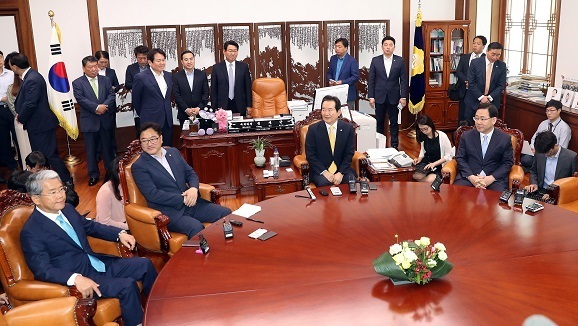Parties’ push for family reunion with NK sparks controversy
By Jo He-rimPublished : June 5, 2017 - 15:52
Four parties agreed Monday to push for a reunion of families separated by the Korean War on Aug. 15 Liberation Day, triggering controversy over the idea’s legitimacy and feasibility due to the absence of the main opposition Liberty Korea Party and an ongoing series of military provocations from North Korea.
At a meeting with National Assembly Speaker Chung Se-kyun, the floor leaders of the ruling Democratic Party of Korea, center-left People’s Party and splinter conservative Bareun Party agreed to introduce a resolution to press for the reunion. But absent in the session was Rep. Chung Woo-taik, interim chief and floor leader of the main opposition Liberty Korea Party, as the party had already announced a boycott after President Moon Jae-in and the ruling party pressed ahead with the appointment of Prime Minister Lee Nak-yon despite its opposition.
At a meeting with National Assembly Speaker Chung Se-kyun, the floor leaders of the ruling Democratic Party of Korea, center-left People’s Party and splinter conservative Bareun Party agreed to introduce a resolution to press for the reunion. But absent in the session was Rep. Chung Woo-taik, interim chief and floor leader of the main opposition Liberty Korea Party, as the party had already announced a boycott after President Moon Jae-in and the ruling party pressed ahead with the appointment of Prime Minister Lee Nak-yon despite its opposition.

“All three parties will make efforts to bring Rep. Chung to the discussion table,” Rep. Kang Hoon-sik, a Democratic Party spokesperson, said in a briefing.
Even without an approval from the nation’s No. 1 opposition party the outlook for the reunions is grim. Viewed as a barometer of the South-North relationship, the reunions had been halted due to North Korea’s continued provocations.
As the Unification Ministry here last week had approved of two organizations contacting its North Korean counterparts in bid to offer humanitarian aid and to revive a celebration of the two’s first joint summit in 2000, the communist regime rejected, organization officials said Monday.
The June 15 South Korean Committee which sought to reinitiate a joint event honoring the historic meeting, said the North has sent a fax which rejected all kinds of visits from the South.
Korean Sharing Movement that was working to deliver supplies to prevent epidemic breakouts there said they also got a similar message via fax.
“North Korea made an issue of the South’s positive attitude towards the latest UN sanction issued last Friday,” Secretary General Kang Young-sik of the civic organization said. “We decided to hold off the supply delivery and the delegate visit to the North for a while.”
Since the first reunion of inter-Korean families in 1985, 19 rounds of face-to-face reunions of the separated families have taken place. The most recent one took place in October 2015.
In Monday’s meeting, the three floor leaders and the parliament speaker also agreed to establish a subcommittee at the National Assembly to set clear standards in vetting high-profile government posts.
As for establishing a multilateral consultative group, which President Moon Jae-in had previously offered as a means to increase cooperation among the parties, they also echoed the need for it to be led by the parliament.
Rep. Chung of the main opposition Liberty Korea Party has previously said the consultative group would be “meaningless” if the Moon government unilaterally decides and delivers messages to the multilateral group.
Regarding the common policy items shared by both the ruling and opposition parties, the floor leaders were also positive.
“Rep. Kim Dong-cheol from the People’s Party said we should also work on other policies which each party had pledged, so we will work on them together as well,” Kang said.
Last week, the State Affairs Planning Advisory Committee, the government’s de facto transition team, chose 44 election pledges that were shared by all five presidential candidates of the main political parties, and made them a priority for the administration’s state affairs.
By Jo He-rim (herim@heraldcorp.com)



![[AtoZ into Korean mind] Humor in Korea: Navigating the line between what's funny and not](http://res.heraldm.com/phpwas/restmb_idxmake.php?idx=644&simg=/content/image/2024/04/22/20240422050642_0.jpg&u=)
![[Exclusive] Korean military set to ban iPhones over 'security' concerns](http://res.heraldm.com/phpwas/restmb_idxmake.php?idx=644&simg=/content/image/2024/04/23/20240423050599_0.jpg&u=20240423183955)



![[Graphic News] 77% of young Koreans still financially dependent](http://res.heraldm.com/phpwas/restmb_idxmake.php?idx=644&simg=/content/image/2024/04/22/20240422050762_0.gif&u=)
![[Herald Interview] Why Toss invited hackers to penetrate its system](http://res.heraldm.com/phpwas/restmb_idxmake.php?idx=644&simg=/content/image/2024/04/22/20240422050569_0.jpg&u=20240422150649)






![[Exclusive] Korean military to ban iPhones over security issues](http://res.heraldm.com/phpwas/restmb_idxmake.php?idx=652&simg=/content/image/2024/04/23/20240423050599_0.jpg&u=20240423183955)



![[Today’s K-pop] Ateez confirms US tour details](http://res.heraldm.com/phpwas/restmb_idxmake.php?idx=642&simg=/content/image/2024/04/23/20240423050700_0.jpg&u=)